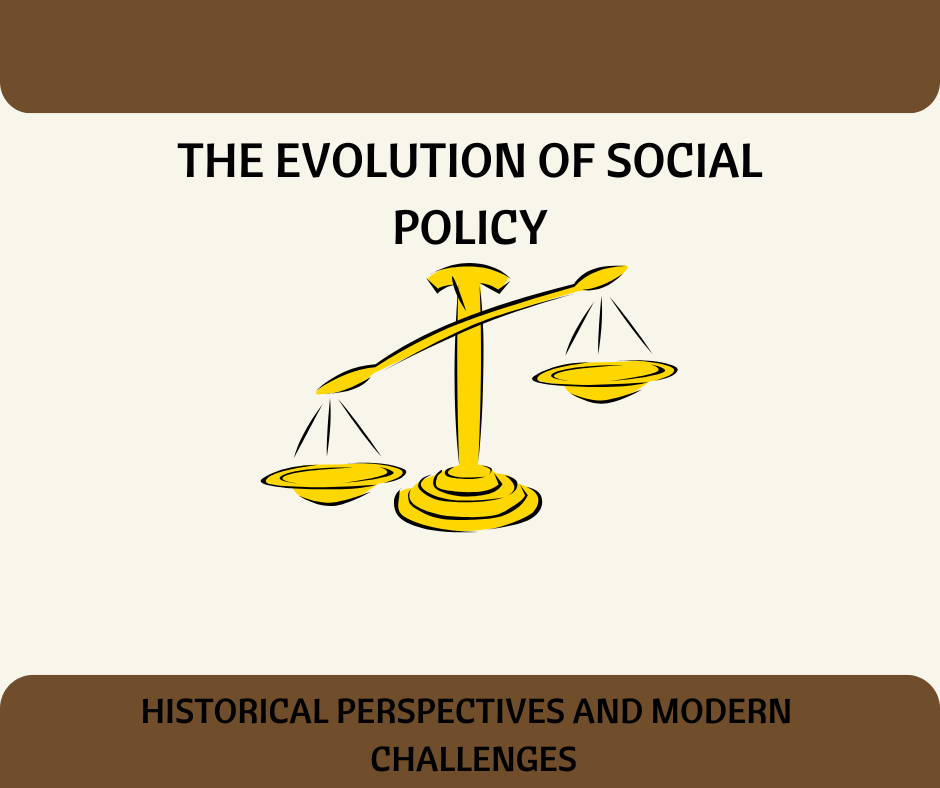Without doubt, Social Policy and Welfare have been the pillar to which societies in all corners of the word owe their historical diversity. It is about addressing some of the most basic human needs through a broad spectrum of interventions aimed at enhancing quality of life, distribution of resources in an equitable manner, and creating a welfare society. The historical origins and the current complex problems reveal how societies have adjusted to different priorities over time.
HISTORICAL PERSPECTIVES ON SOCIAL POLICY
Ancient civilization traced the birth of social policy, where welfare has its roots in moral and religious obligations. Systems of mutual aid and charity in ancient Egypt, Greece, and Rome were also administered through temples and local communities. They were early efforts toward the poor, sick, and weak but in frail forms.
During the Middle Ages, the Church took on a broad role, although usually through almsgiving and house for the needy, to welfare. All these were, however, fragmentary and inadequate to respond to systematic issues such as poverty and inequality.
Socio-political changes of great magnitude that speedily mastered themselves in the early and late 18th and 19th centuries were the poverty associated with child labor and inadequate housing. These were the conditions that were catalysts for governments and reformers to set up their policies against social inequities as in Poor Law reforms in England and early labor laws that sought better working conditions.
At the close of this century, another kind of revolution in social policy had taken place; with the advent of the welfare state, by which societies in Europe and North America, especially, had initiated actions with which they ended their respective governments’ interventions.
Contemporary Challenges in Social Policy Moderns are the well-constructed architectures of historical social policies that have now evolved to face social policy challenges in the present day. Globalization, deteriorating environment, and technological advancement have been issues that changed the entire landscape of social policy. They demand innovative solutions for sustainability, equity, and inclusiveness.
-
GLOBALIZATION AS A BASIS OF INEQUALITY
Globalization truly provides an opportunity for economies and societies to link themselves like none other in their history; it brought about economic growth and innovation, but on the other hand it has worsened the inequalities that nations possess with one another and within themselves. To build safety nets as a way to counteract the negative effects of globalization such as unemployment and stagnated wages is another problem most policymakers face. Creating solutions for fair trade, labor rights, and inclusive economic policies remain critical.
-
ENVIRONMENT, SUSTAINABILITY, AND SOCIETY
The environmental sustainability and social policy nexus is becoming increasingly relevant. Vulnerable populations suffer disproportionately through climate change, resource depletion, and environmental degradation; even worse, they aggravate existing social inequalities. Decoupling sustainability from Social Policy and Welfare frameworks is counter to achieving long-and short-term societal welfare. One example is the programs concerning renewable energy, sustainable agriculture, and green jobs, which tackle both the environmental and social fronts.
-
ADVANCES IN TECHNOLOGY
Advancements in technologies transform the way of living along one’s work. They open up new employment opportunities while bringing challenges such as job automation and digital divides. Social policies must now be formulated to benefit all in society. Investments in digital literacy programs, equitable access to technology, and privacy and cybersecurity issues are encompassed.
MAIN ROLE OF ACADEMIC RESEARCH IN SOCIAL POLICY SHAPING
They are avenues towards their work in advancing social policy knowledge and knowledge about its effects. They are publications such as Environment, Sustainability, and Society, and others in the field like Social Policy and Welfare. Evidence-based contributions are geared towards the promotion of the creation of policies by linking research to practice within that avenue.
Most papers published in these journals call for research that takes an interdisciplinary approach to social policy. Thus, research from the perspective of environmental sustainability and social welfare has pushed for hybrid policy solutions on multiple fronts of social well-being. Similar emphasis is given to studies investigating the effects of globalization, where inclusive policies are expected for the marginalized.
EMERGING TRENDS IN SOCIAL POLICY
Changing patterns become the outline for these social services in future. These settings include:
Universal Basic Income (UBI): Increasingly touted as a way to provide such security and poverty reduction with the major shifts brought about by automation and the gig economy in labor markets of developing economies.
Community-Led Initiatives: Local communities that have driven planning and development of a social policy ensuring unique and context-relevant interventions and effectiveness.
Data-Driven Decision Making: Big data and AI used to provide precise and efficient social policies interventions.
Mental Health-Focus: It’s a growing recognition that mental well-being is also critical for societal well-being, and hence the speed with which investments are made in mental health services and awareness creation.
CONCLUSION
Social policy and welfare continues to define the aspiration of humanity toward justice, equity, and sustainability. If we look at that journey from a contemporaneous standpoint, historical lessons have to be applied to usher in inventive measures past complexities. It will require government, academia, and civil society working together in policy creation to vest them with that future in which current challenges are taken into account while preparing for a more equitable and sustainable future.
With the above missions and promises, publications such as Environment, Sustainability, and Society and Social Policy and Welfare would stretch themselves in shaping debate and engagement with social policy. Such academic journal will enable scholars to facilitate dialogue and research toward keeping that social policy responsive to the needs of a changing world.
Summarized, indeed, the course of social policy-finished from historical beginnings to contemporary challenges-is a yardstick for the durability and adaptability of societies. Globalization, environmental sustainability, and many more can be within the ambit of definitions.

